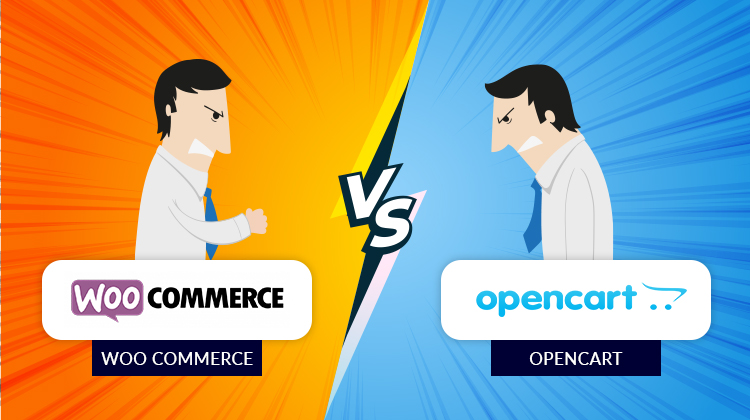
29 Jul, 2020
In today’s digital age, businesses are increasingly turning to online services and e-commerce platforms to extend their reach and streamline sales. Having an online presence not only broadens your customer base but also builds trust and credibility. By selecting the right platform and applying effective strategies, businesses can significantly enhance sales and brand awareness. With a wide range of platforms available, it’s essential to choose one that aligns with your business needs. In this article, we’ll compare two of the most popular e-commerce platforms—WooCommerce and OpenCart—to help you make an informed decision.
As a leading ecommerce website development company in Kolkata, we’re here to guide you through the key features of each platform so you can decide which one suits your business best.
WooCommerce and OpenCart: A Detailed Overview
Both WooCommerce and OpenCart are powerful tools for building and managing an online store, but they cater to different business requirements. Below, we will explore the strengths and limitations of both platforms in terms of ease of use, customization, performance, security, and more.
WooCommerce: The WordPress Powerhouse
WooCommerce, launched in 2011 by WooThemes, is a widely-used WordPress plugin designed to transform a WordPress website into a fully functional e-commerce store. One of WooCommerce’s biggest advantages is its seamless integration with WordPress, which provides access to a vast ecosystem of plugins and themes.
-
Ease of Use: WooCommerce is particularly well-suited for businesses already familiar with WordPress. Its intuitive interface allows even non-technical users to install and set up a store with minimal effort. A basic setup takes only a few clicks, making it accessible to businesses of all sizes.
-
Customization: WooCommerce offers over 2,100 free themes and more than 30,000 paid themes. This wide selection allows businesses to deeply customize the appearance and functionality of their stores. Additionally, WooCommerce supports a wide range of third-party plugins that enable advanced functionalities such as customer relationship management (CRM), inventory management, and marketing tools.
-
Performance and Scalability: WooCommerce performs well for small to medium-sized stores, but its performance can vary based on server capacity and the number of plugins installed. For large-scale businesses, hosting infrastructure must be optimized to ensure fast loading times and smooth scalability as the store grows.
-
Security: WooCommerce leverages WordPress’s security features, but you may need to install additional security plugins to fully protect your store from threats. Regular updates and compliance with PCI standards are essential for safeguarding customer data.
-
SEO Capabilities: WooCommerce is highly SEO-friendly, largely because of its integration with WordPress. Using popular SEO plugins like Yoast, you can easily optimize product pages, blog content, and overall site structure to rank higher in search results.
OpenCart: A Flexible, Open-Source Platform
OpenCart, launched in 2008, is an open-source e-commerce platform that offers flexibility and affordability. It’s particularly suited to small and medium-sized businesses that require a budget-friendly option.
-
Ease of Use: While OpenCart is generally user-friendly once installed, the initial setup can be more challenging for non-technical users. Manual installation requires some technical skills, although many hosting providers offer one-click installation to simplify the process.
-
Customization: OpenCart provides fewer themes and extensions compared to WooCommerce. The available themes are basic, and setting up a fully customized design usually requires knowledge of HTML and CSS. However, OpenCart’s strength lies in its ability to manage multiple stores from a single interface, making it ideal for businesses that operate multiple e-commerce websites.
-
Performance and Scalability: OpenCart is lightweight and performs efficiently for small and medium-sized stores. However, large stores may require performance optimization, especially if they handle high traffic volumes or complex transactions. The open-source nature of OpenCart allows businesses to modify the code for better scalability if needed.
-
Security: OpenCart offers basic security features out-of-the-box, but additional measures such as SSL certificates and security plugins are recommended. Regular updates are critical to maintaining a secure platform.
-
SEO Capabilities: OpenCart’s SEO features are more basic compared to WooCommerce. You can optimize product pages and URLs, but some advanced SEO functionalities may require additional extensions or coding knowledge.
Key Comparison Points
1. Installation & Ease of Use
WooCommerce offers a seamless installation process through WordPress, making it highly accessible for users without technical expertise. OpenCart, on the other hand, requires manual installation, which can be more difficult, though some hosting providers do offer simplified installation options.
2. Customization and Design
WooCommerce provides significantly more design flexibility, with thousands of free and paid themes available. Its extensive plugin ecosystem also enables users to add complex features without needing to write code. In contrast, OpenCart offers basic design options, and advanced customization often requires knowledge of coding languages like HTML and CSS.
3. Performance and Scalability
Both platforms are scalable, but WooCommerce’s performance is heavily dependent on server capacity and the number of installed plugins. OpenCart is more lightweight and performs efficiently for smaller stores, though larger stores may need additional optimization.
4. Pricing
Both WooCommerce and OpenCart are free to download and use. However, WooCommerce may incur additional costs for premium themes, hosting, and plugins. OpenCart can be more cost-effective, but businesses may need to hire developers to customize their store or resolve technical issues, which could increase costs.
5. Customer Support
WooCommerce benefits from a vast WordPress community, with numerous forums, documentation, and tutorials available online. OpenCart has a smaller support community but offers paid support plans for businesses needing more direct assistance.
6. SEO Capabilities
WooCommerce excels in SEO, thanks to its integration with WordPress and powerful SEO plugins. OpenCart provides basic SEO options, but advanced customization may require technical skills or extensions.
Choosing the Right Platform for Your Business
The choice between WooCommerce and OpenCart depends largely on your business needs, technical expertise, and future scalability.
-
WooCommerce is ideal for businesses that already use WordPress or those seeking a highly customizable, SEO-friendly platform with a vast plugin ecosystem. Its user-friendly interface makes it easy for businesses to manage their online stores without requiring extensive technical knowledge.
-
OpenCart is a great option for small to medium-sized businesses looking for a cost-effective, lightweight platform that supports multiple stores. While it may require more technical expertise upfront, OpenCart offers flexibility and control, especially for businesses that want to manage several stores from one dashboard.
Conclusion
Both WooCommerce and OpenCart are strong contenders in the e-commerce space, but each platform caters to different needs. If you’re unsure which one is right for you, consider reaching out to an experienced ecommerce website development company in Kolkata for guidance. At Idiosys Technologies, a leading ecommerce company in Kolkata, we offer customized e-commerce solutions to help your business thrive online. Whether you’re launching your first store or scaling an existing one, our team of skilled developers can assist you in selecting and developing the right platform for your business needs.
--------------------------------------------------------------------------------------
Which platform is more customizable: WooCommerce or OpenCart?
Both platforms are customizable, but WooCommerce offers more flexibility thanks to WordPress's extensive plugin ecosystem, while OpenCart is more customizable on the backend through code.
Which is easier to set up: WooCommerce or OpenCart?
WooCommerce is easier to set up for users familiar with WordPress, while OpenCart may require more technical knowledge to get started as it’s a standalone platform.
What are the server requirements for WooCommerce and OpenCart?
WooCommerce requires a WordPress hosting environment, while OpenCart can run on standard PHP/MySQL hosting, but may need specific configurations depending on the version.
Which platform offers better SEO options?
WooCommerce has more robust SEO options due to its integration with WordPress, which has a variety of SEO plugins like Yoast SEO.
Can I manage multiple stores with WooCommerce or OpenCart?
OpenCart natively supports multi-store management, whereas WooCommerce requires third-party plugins to manage multiple stores.
Which platform is easier to customize for a non-developer?
WooCommerce is easier to customize for non-developers because of WordPress's user-friendly interface and a wide variety of drag-and-drop page builders.
Are there free plugins available for both platforms?
Yes, both platforms offer free and paid plugins to enhance functionality.
Which platform offers more flexible shipping options?
WooCommerce offers more flexible shipping options with the use of plugins, while OpenCart also provides solid shipping functionalities out of the box.
Which platform performs better with high traffic?
OpenCart may perform better under high traffic out of the box, while WooCommerce can handle high traffic but may require performance optimization techniques such as caching.
--------------------------------------------------------------------------------------
YOU MAY ALSO READ

